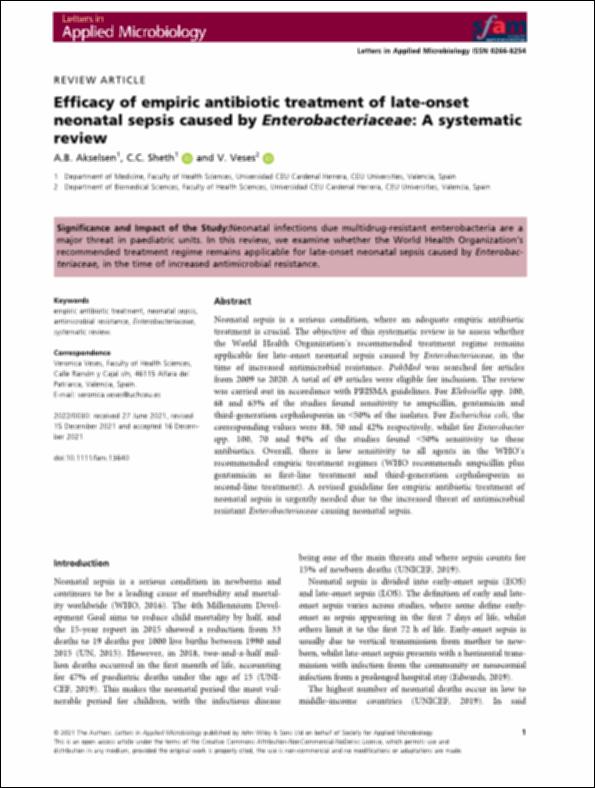Please use this identifier to cite or link to this item:
http://hdl.handle.net/10637/13432Efficacy of empiric antibiotic treatment of late-onset neonatal sepsis caused by "Enterobacteriaceae" : a systematic review
| Title: | Efficacy of empiric antibiotic treatment of late-onset neonatal sepsis caused by "Enterobacteriaceae" : a systematic review |
| Authors : | Akselsen, A.B. Sheth Shah, Chirag Chandrakant Veses Jiménez, Verónica. |
| Keywords: | Niños recién nacidos - Enfermedades - Tratamiento.; Newborn infants - Diseases - Treatment.; Sepsis neonatal - Farmacoterapia.; Drug resistance in Enterobacter.; Neonatal sepsis - Chemotherapy.; Antibiotics.; Enterobacterias - Resistencia a los medicamentos.; Antibióticos. |
| Publisher: | Society for Applied Microbiology John Wiley & Sons |
| Citation: | Akselsen, A.B., Sheth, C.C. & Veses, V. (2021). Efficacy of empiric antibiotic treatment of late-onset neonatal sepsis caused by "Enterobacteriaceae" : a systematic review. Letters in Applied Microbiology, Online Version (24 dec.). DOI: https://doi.org/10.1111/lam.13640 |
| Abstract: | Neonatal sepsis is a serious condition, where an adequate empiric antibiotic treatment is crucial. The objective of this systematic review is to assess whether the World Health Organization’s recommended treatment regime remains applicable for late-onset neonatal sepsis caused by Enterobacteriaceae, in the time of increased antimicrobial resistance. PubMed was searched for articles from 2009 to 2020. A total of 49 articles were eligible for inclusion. The review was carried out in accordance with PRISMA guidelines. For Klebsiella spp. 100, 68 and 63% of the studies found sensitivity to ampicillin, gentamicin and third-generation cephalosporin in <50% of the isolates. For Escherichia coli, the corresponding values were 88, 50 and 42% respectively, whilst for Enterobacter spp. 100, 70 and 94% of the studies found <50% sensitivity to these antibiotics. Overall, there is low sensitivity to all agents in the WHO’s recommended empiric treatment regimes (WHO recommends ampicillin plus gentamicin as first-line treatment and third-generation cephalosporin as second-line treatment). A revised guideline for empiric antibiotic treatment of neonatal sepsis is urgently needed due to the increased threat of antimicrobial resistant Enterobacteriaceae causing neonatal sepsis. |
| Description: | Este artículo se encuentra disponible en la siguiente URL: https://sfamjournals.onlinelibrary.wiley.com/doi/10.1111/lam.13640 |
| URI: | http://hdl.handle.net/10637/13432 |
| Rights : | http://creativecommons.org/licenses/by-nc-nd/4.0/deed.es |
| ISSN: | 0266-8254 1472-765X (Electrónico) |
| Issue Date: | 24-Dec-2021 |
| Center : | Universidad Cardenal Herrera-CEU |
| Appears in Collections: | Dpto. Ciencias Biomédicas |
Items in DSpace are protected by copyright, with all rights reserved, unless otherwise indicated.


